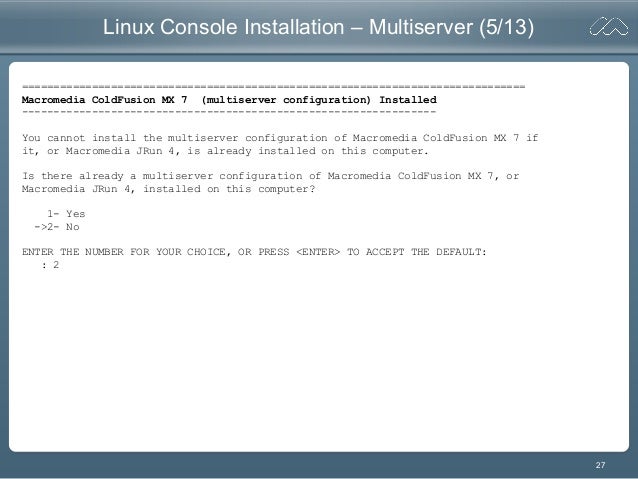Jrun Server Enterprise 3.0 Upgrade From Jrun Server 3.0 Pro
You are going to have to supply some more information as we don't have in depth knowledge of JRUN errors. What protocol are you running this over (HTTP, custom, etc)? What signifies an error? Is it a protocol level status code like and HTTP 500 error? Or is it something in the payload that you need to parse out?

IRules makes it very easy to search response content but you have to know what you are looking for first. Text streams are easier, binary streams are doable as well but a bit more tricky to write. If you provide all the details as to the protocol you are using as well as what signifies an error, we will be able to guide you in the right direction. So you are looking for error codes in the connection from the client to the server?
Server 3.0 advanced with 2 year subscription.allaire jrun server advanced upgrade from pro.jrun is. Application.jrun server enterprise 3.0 upgrade from jrun. Buy JRun Server 3.0 Enterprise (1 CPU Licence) Win at a low price from the Amazon Software store.
JRun Server 3.0 Enterprise PC. By Macromedia. JRun Server Enterprise 3.0 Upgrade from JRun Server 3.0 Pro (4-CPU) PC/Mac. By Macromedia. Currently unavailable.

Hitman Absolution Crack-only Skidrow here. Usually error codes are responses from the servers. If this is the case, you can do a HTTP::collect in the HTTP_REQUEST event. This will trigger the HTTP_REQUEST_DATA event to be called when the system has collected the specified amount of data from the client. You can then access the HTTP::payload and search as you would with any other string.
How and what you set the collect size to depends on what protocol the error is coming across on. With HTTP, you can use the Content-Length header (if it exists). Please verify that the error does indeed come from the client (the request) and not the server (the response) and we can provide you a snippet of code to do the work. Or you could just search the forums for HTTP::collect and you'll find some examples yourself.
>>>>Migrating from JRun 3.x JRun provides a migration tool for migrating JRun 3.x servers and configuration settings to JRun 4. Although you can deploy JRun 3.x J2EE modules in JRun 4 without using the migration tool, the tool exports many of the settings on which modules depend. Note: Before deploying a JRun 3.x web application in JRun 4, you must delete all compiled JSP classes from the web application WEB-INF/jsp directory. You must also delete the corresponding.java source files. The migration tool does not migrate the following items: JRun 3.0 EJBs; you can migrate JRun 3.1 EJBs java:comp as the prefix for JNDI lookups; see JRun Administrator's Guide for JRun 4 JNDI naming conventions Launcher classpath settings Dependencies on JRun 3.x-specific classes The wildcard character (*) in the users.properties file Logging settings JavaMail settings JMS settings Advanced global.properties and local.properties overrides For more information, see the. For more information about JRun 4 configuration, see JRun Administrator's Guide and JRun Assembly and Deployment Guide.
Before upgrading to JRun 4 Before running the migration tool, perform the following steps: Ensure that your JRun 3.1 servers are valid before migrating them to JRun 4. Eurostile Extended Font Mac. Back up your JRun 3.1 project directories. In your JRun 3.1 applications, ensure that the WEB_INF/jsp directory is empty.
Running the migration tool The JRun 4 migration tool makes it easy for you to upgrade JRun 3.x servers and configuration settings to JRun 4. The tool migrates all servers and applications, and generates a summary report, migration.html, located in the root directory of your JRun 4 installation ( jrun_root). To use the migration tool: 1 At a command prompt, change to the jrun_root/bin directory of your JRun 4 installation.
2 Enter the following command.
Comments are closed.